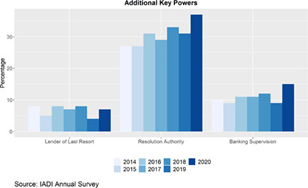Amending and supplementing legal regulations on the timing of the obligation to reimburse insurance is necessary.
Regarding the timing of the obligation to reimburse insurance, Article 22 of the 2012 Law on Deposit Insurance stipulates: "The obligation to reimburse insurance arises from the time when the SBV issues a document terminating special control or a document terminating or not applying measures to restore solvency, but the credit institution (CI) participating in deposit insurance still falls into bankruptcy, or the SBV issues a document determining that the foreign bank branch participating in deposit insurance is unable to reimburse deposits to depositors."
However, the 2024 Law on Credit Institutions (CIs) has now been amended and supplemented with regulations on special control of CIs, including amendments and additions to the provisions on the termination of special control and the implementation of CI bankruptcy plans, specifically:
Clause 4, Article 168 on the termination of special control in the 2024 Law on CIs currently stipulates that the SBV shall consider and decide to terminate special control over CIs under special control: "The judge appoints an asset management officer or asset management and liquidation enterprise to carry out the bankruptcy procedures for CIs under special control."
Meanwhile, Clause 1, Article 190 of the 2024 Law on CIs stipulates: "After the bankruptcy plan has been approved, the deposit insurer is responsible for coordinating with the CI under special control to reimburse deposit insurance to depositors according to the bankruptcy plan."
Therefore, according to the SBV, amending and supplementing legal regulations on the timing of the obligation to reimburse insurance is necessary to ensure social security and order, stabilize depositors' psychology, prevent chain reactions, protect depositors' rights and interests, and contribute to maintaining safety and social order. Deposit insurance should be involved earlier in reimbursing depositors at weak CIs.
Additionally, there should be a mechanism to fully reimburse depositors’ insured deposits in special cases to prevent chain reactions and mass withdrawals, thereby minimizing liquidity risks for CIs. Regarding this matter, Article 188 of the 2024 Law on CIs currently stipulates that during the process of developing a bankruptcy plan, the SBV shall submit to the Prime Minister a decision on the deposit insurance reimbursement limit for depositors, with a maximum equal to the insured deposits of individuals at the CI.
If the above issues are not addressed, it will lead to inconsistencies between the regulations in the Law on CIs and the Law on Deposit Insurance, making it difficult to determine the timing of deposit insurance reimbursement. Furthermore, there will be no mechanism to handle special cases, especially when a CI with significant systemic impact goes bankrupt, potentially causing systemic collapse, affecting depositors’ rights and social safety and order.
The SBV believes that the root cause of the issue lies in the provision on the timing of the obligation to reimburse deposit insurance in the Law on Deposit Insurance, which is based on the timing of the termination of special control as stipulated in the Law on CIs.
Since the 2024 Law on CIs has amended and supplemented related provisions, the Law on Deposit Insurance must also be revised to ensure that the objectives and functions of the deposit insurance organization are properly implemented. Moreover, resolving this issue aims to ensure synchronization and consistency in legal regulations, provide a basis for determining the timing of deposit insurance reimbursement in a timely manner, meet the requirements and objectives of deposit insurance, and establish a mechanism to fully reimburse insured deposits for depositors in special cases. This will enhance the role of deposit insurance, stabilize depositors’ psychology, and limit systemic risk transmission affecting the safety of the financial system.
Proposed Solutions to Ensure Depositors' Rights
Accordingly, the SBV proposes solutions and analyzes their impacts.
First, maintaining the current legal framework. In this case, regarding constitutional legality and policy consistency, the regulatory body believes that the legal framework lacks uniformity, failing to ensure the objective of deposit insurance in promptly reimbursing depositors and maintaining CI stability. However, this solution does not violate any international treaties to which Vietnam is a signatory. Nevertheless, it does not provide positive impacts for the deposit insurer or insured institutions.
Furthermore, maintaining the current regulations would create difficulties in determining the timing of deposit insurance reimbursement, affecting the timeliness of payments to depositors. There would be no basis for fully reimbursing insured deposits at weak-insured institutions with significant systemic impact. Notably, the absence of timely reimbursement or a specific mechanism to stabilize depositor psychology in special cases could lead to mass withdrawals, threatening system stability.
Second, amending the Law on Deposit Insurance to:
- Clearly define the timing of the obligation to reimburse insurance in alignment with the handling process for weak CIs under the Law on CIs.
- Adjust the reimbursement timeframe to expedite payments in cases where claims are complete and eligible, thereby stabilizing depositor psychology.
- Introduce provisions allowing the Prime Minister to approve full reimbursement of insured deposits in special cases, as proposed by the SBV when the obligation to reimburse insurance arises.
This solution ensures consistency in legal regulations while aligning with Vietnam’s international commitments.
From a socio-economic perspective, implementing this solution would help maintain public order and stability. Clearly defining reimbursement timing across legal frameworks ensures timely payments, reducing complaints and disputes from depositors due to delays.
For depositors, their rights would be safeguarded with timely deposit insurance payments. For insured institutions, prompt reimbursement and a full payout mechanism would mitigate systemic risks, ensuring stability in CI operations.
In special cases, the deposit insurer would fully reimburse insured deposits, requiring financial capacity enhancements to meet new responsibilities. This aligns with the SBV’s policy on strengthening deposit insurers’ financial mechanisms to improve operational efficiency.
The SBV assesses that this solution has no negative impacts on insured institutions or depositors and does not introduce additional administrative procedures.
After analyzing policy impacts and weighing the pros and cons of each solution, the SBV recommends selecting the second option to harmonize legal provisions on deposit insurance reimbursement timing. To effectively resolve the identified issues, it is necessary to propose the development of the Revised Law on Deposit Insurance to the National Assembly.
Internationally, when deposit insurers lack sufficient reimbursement resources, they may receive emergency funding from the private sector, the Ministry of Finance, or the central bank. Emergency central bank funding is widely applied globally. In Vietnam, under Clause 2, Article 190 of the 2024 Law on CIs, the SBV provides special loans to the deposit insurer if its reserve fund is insufficient to reimburse depositors under an approved bankruptcy plan.
Ultimately, deposit insurance reimbursement is a fundamental function of any deposit insurer worldwide, reflecting its role in protecting depositors’ legal rights and ensuring system stability. Experts emphasize that a well-defined reimbursement timeline demonstrates the state’s commitment to promptly paying insured deposits within coverage limits or even fully reimbursing depositors in the event of insured institution bankruptcy, reinforcing public confidence in the CI system. Establishing an early reimbursement timeline stabilizes depositor psychology, ensures public order, and prevents systemic risks.
Furthermore, inconsistent legal timelines, as seen in current regulations, create challenges for the deposit insurer in determining and executing timely reimbursements.
According to the International Association of Deposit Insurers (IADI), deposit insurance systems should ensure quick depositor access to insured funds. Deposit insurers must be informed in advance of potential reimbursement situations and have prior access to depositor information.
The 2024 Law on CIs stipulates that after bankruptcy plans are approved, the deposit insurer must coordinate with the special-controlled CI to reimburse deposit insurance to depositors according to the plan.
Thus, to ensure consistency in legal regulations, revising the timing of the obligation to reimburse insurance is necessary to stabilize depositor psychology, prevent chain reactions, protect depositor rights, and maintain social order and safety.
Communication Department (Translation)



























